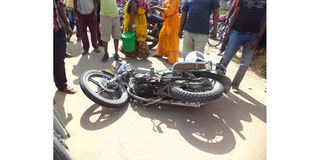Motorcycle accidents cause nearly half of all road deaths in Tanzania

What you need to know:
- A total of 2,799 accidents in 2024 involved motorcycles, cementing their place as the primary cause of traffic-related injuries and deaths in the country
Dar es Salaam. Motorcycle crashes continue to be one of the deadliest forms of road incidents in Tanzania, claiming hundreds of lives and injuring many more, according to the newly released Crime and Traffic Incidents Statistics Report, January–December 2024 by the Tanzania Police Force.
The report shows that 435 motorcycle crashes were recorded in 2024 alone, making them the leading cause of traffic-related injuries and deaths in the country.
Out of the total 1,521 road accident deaths recorded nationwide, motorcycles accounted for 378 fatalities—representing nearly a quarter of all road deaths. In addition, 395 people sustained injuries in motorcycle-related crashes.
Meanwhile, a total of 1,735 road accidents were reported between January and December 2024, most of which (1,684) were caused by human factors—contributing to 97.1 percent of all road accidents. Defective motor vehicles accounted for 39 accidents (2.2%), while environmental and infrastructure factors contributed to 12 accidents (0.7%).
However, despite a slight 0.7 percent decline in the number of bodaboda crashes compared to last year, total fatalities increased by 1 percent, and injuries rose by 3.7 percent.
Tanzania's Traffic Police Commander, William Mkonda, acknowledged the seriousness of the issue and said that traffic police officers across the country have been working diligently to ensure road users comply with safety regulations aimed at preventing accidents.
“Our traffic teams are doing their job with commitment—checking documents, enforcing helmet use, preventing overloading, and penalising those who do not follow the law. We are taking firm action against riders found without valid licences or safety gear,” he said.
He added: “We recognise that bodaboda is now employing thousands of young people across the country, and many of them are operating in good faith. But what they need is education and guidance to understand the legal framework, the safety standards, and how non-compliance puts their lives—and the lives of their passengers—at serious risk.”
He went on to say that enforcement alone is not enough. He called for frequent outreach to bodaboda stands to engage riders in safety talks and awareness campaigns.
“These riders are organised. They operate from specific stands and are often part of local networks. We are giving them education on that so that we can reduce accidents significantly,” he said.
Experts say the issue is being fuelled largely by the casual and unregulated way in which many motorcycle riders enter the transport business.
According to a senior instructor at the National Institute of Transport (NIT), Mr Athumani Shayo, a worrying number of riders begin operating bodaboda within just days of learning how to ride—usually through informal, peer-led coaching rather than structured driving education.
“One of the most serious contributors to the rise in motorcycle accidents is the fact that most riders learn on the streets. A friend teaches them the basics—how to balance, how to accelerate and brake. But that’s where the training ends,” he said.
He continues: “There’s no formal education on road signs, traffic laws, rider etiquette, passenger handling, or accident avoidance techniques. After just a few days of self-learning, some even buy or rent a motorcycle and hit the road with paying customers. This is incredibly dangerous, not only for them but for every other road user.”
Mr Shayo emphasised the need for frequent and uncompromising licence checks targeting bodaboda operators, even if it inconveniences some commuters initially.
“Yes, many people rely on motorcycles to get to work quickly or avoid traffic jams, but that cannot justify turning a blind eye to the safety risks. I strongly believe that if we made it a routine for traffic officers to stop and verify licences, roadworthiness of motorcycles, and safety gear compliance, we would start seeing behaviour change,” he said.
He added that although some passengers might complain about being delayed during these checks, they would ultimately benefit from safer journeys.
“It’s better to delay someone for a few minutes than to rush them to the hospital—or worse, the mortuary,” he shared.
A senior training officer at the Vocational Education and Training Authority (Veta), Dar es Salaam, Ms Sarah Mkumbo, echoed these sentiments and said the system needs to adjust its delivery model to reach more riders who operate informally.
“It’s not enough to wait for riders to come to training centres. We must go to them. Many of them are well-organised now, operating from designated bodaboda stands and forming local associations. These structures give us an excellent platform to bring training directly to their areas,” she said.
Ms Mkumbo noted that the problem is no longer access to information, but rather how that information is delivered.
“Many of these young men are working long hours just to make ends meet. Telling them to take a week off and attend training at a far-off centre doesn’t work. Instead, we should be meeting them in their own communities—early mornings or evenings—and providing short, practical safety lessons. If Veta, in partnership with local governments and the police, can make this a routine, we will start to see fewer crashes,” she said.
She added that community-based training would not only improve safety knowledge but also reinforce a culture of responsibility and accountability among riders.




